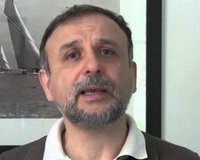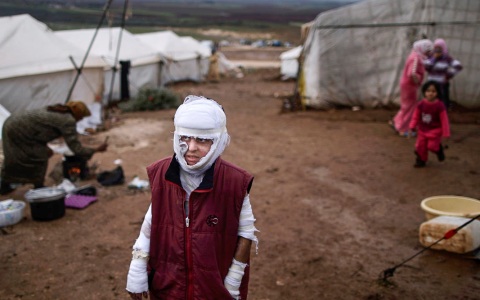'Let clergy help end Syria madness'
by - 13th September 2013
 THE ANGLICAN church is engaging in vigorous anti-war diplomacy as the prospect of a regional cataclysm over Syria looms.
THE ANGLICAN church is engaging in vigorous anti-war diplomacy as the prospect of a regional cataclysm over Syria looms.
Revd Nadim Nassar, the world’s only ordained Syrian Anglican clergyman, and Director of the London-based Awareness Foundation, spoke to Lapido fresh off a flight from New York where he has been promoting the foundation’s work.
He said his aim was to help the Christian church ‘to be a counter force ... in the face of intolerance and aggression.’
He was sceptical of Western rhetoric about chemical weapons ‘crossing a line’.
The number of deaths in Syria’s civil war was approaching two million, far more than most media statistics. ‘Are two million people killed by guns and bombs children of a lesser God than 2,000 killed by gas? To strike, or not to strike. How will that end the conflict?’
Nassar’s own proposals for how peace negotiations could be restarted are novel:
‘Syrians are religious by nature. It is part of their DNA. They respect the clergy and listen to them.
‘Why not select a group of clergy from right across the board, take them to a neutral place, and have them issue a call to come to the table to end the madness?’
He sees the Christians, the Druze – who started the independence movement in Syria - and other minorities playing an important part.
‘The Druze have suffered because they have tried not to take sides,’ he said.
It needs the West, Russia and others to tell the various forces and factions that unless they come to the table there will be no more funding for their war effort.
Nassar tells of living in Lebanon in 1984 when the US deployed the SS New Jersey. The official reports say it fired almost 300 shells at Druze and Shi'ite positions in the hills overlooking Beirut, the heaviest shore bombardment since the Korean War.
‘The shells turned midnight into day. But what did it achieve? The upshot: more devastation, more killed, more hatred planted, more division. The war in Lebanon continued for 17 years.’

Nassar warns that to bring the Assad regime down by force will take a protracted fight. And even if it wins a military victory, the regime will never be able to silence opposition because of its repressive nature. ‘So what do we do? Allow a conflict to go on for 17 years? The Syrian Army is not Libya. It is one of the mightiest in the Middle East.’
He believes the Assads have been preparing militarily ‘for this moment.’ They have armed themselves not in prospect of war with Israel, but to shore up their oppressive regime.
He sees a choice between a drawn-out conflict or getting all the parties to the peace table. He believes the peace plan of Kofi Anan, the former UN Secretary General, was a good one, but failed because it set too many preconditions.
‘If he had simply tried to get people around the table without preconditions it would have worked.’
Lessons from Vietnam
America’s foreign policy has for years been framed around the idea that ‘my enemy’s enemy is my friend.’ Examples are legion. One of the most notorious was the US policy which kept Ngo Dinh Diem, the corrupt and incompetent ruler of South Vietnam, in power from 1955–1963.
The Vietnam engagement began with the US and later their south Pacific allies taking the seemingly innocuous action of sending ‘military advisers’ to help Ngo Dinh Diem. It took the US two decades to extricate itself. The death toll of American forces alone was 60,000 with almost three times that number wounded. The local casualties are countless. Will a ‘limited’ strike against Syria end there?
The US effectively created South Vietnam as a client state, reasoning that a friendly regime at the toe of the Indochina peninsula would check the expansion of Chinese communism in the region.
Diem eventually became such a liability that he was assassinated in a Central Intelligence Agency-backed coup. The action apparently caught President John F Kennedy by surprise.
The sad irony was that the US never understood the Vietnamese culture.
Former US Defence Secretary Robert McNamara admitted as much in his book Argument Without End (1999).
The Australian government, which took the word of the Americans and introduced conscription to raise an army, did not have a single staffer in its Foreign Affairs Department who understood the Vietnamese language.
The moral of the story of America’s support of Diem and many before and after him, is that this kind of flawed policy eventually bites its perpetrator.
We are still seeing the effects of this policy as applied in Afghanistan. The US rightly opposed the Russian invasion there and supported uncritically groups who took up arms against them.
What the US never reckoned on was that after the exit of the Russians, Afghanistan would be the prey of a clutch of unsavoury groups radicalised by the experience of invasion.
When the Foreign Secretary William Hague suggested that Britain should arm the rebels to help overthrow the regime of the Syrian ruler Bashar Hafez al-Assad, in effect he and those Americans who want to strike against Syria are lining up alongside Al-Qaeda which perpetrated 9/11.
The aim of these insurgents is to impose radical Islam on a country where secular government has up to now guaranteed cultural and religious pluralism.
While its faults are manifest the al-Assad regime until now has, for example, shielded Syria’s ancient Christian minority. This minority pre-dates the missionary work of St Paul and before the civil war numbered about ten per cent of the population. Many Christians are saying they have no future in Syria.
There are consistent reports of brutal attacks on Christians and their churches but they are rarely heard in the Western media because of restrictions being imposed on reporting which mean information cannot be verified.
Nor is the use of child soldiers by the insurgents discussed. Likewise heroic work in the war zone by Syrian Christian doctors who stay on regardless of grave risk to themselves remains under the radar.
Colin Chapman an expert on the Near East who taught in Lebanon for many years, and was the Archbishop of Canterbury’s emissary to al-Azhar University in Cairo, has expressed relief that the House of Commons ruled out intervention by Britain.
He told Lapido that ‘Intervention of this kind is only likely to make the regime ever more aggressive. It would also identify us [Britain] too closely with one party in the conflict and make it impossible for us to play any kind of mediating role in diplomatic negotiations between the two sides.’
The decision by US President Barak Obama to hold off strikes against Syria in retaliation to alleged chemical weapon attacks by the al-Assad regime has left a void making possible ‘back channel’ diplomacy which could create alternatives to all-out military action by the US and its allies.
America hardly occupies the moral high ground on chemical weapons. An iconic black and white Pulitzer Prize winning photo from 1972 depicts a nine year-old girl who tore off her burning clothes and fled naked from the village of Trang Bang near Saigon (now Ho Chi Minh City). An American aircraft had mistaken fleeing civilians for enemy troops and dropped napalm, a highly flammable fuel, causing deaths and excruciating pain. Kim Phuc Phan Thi needed to be hospitalised for 14 months, and underwent 17 surgical procedures, to treat her burns.
Almost three and a half decades after the end of the Vietnam conflict large areas of rainforest remain blighted thanks to an estimated 20 million gallons of chemicals dropped on the landscape. The US also deployed the toxic Agent Orange, which according to the Red Cross has left one million Vietnamese people with disabilities or other health problems.
The US has turned a blind eye to Israel’s use of white phosphorus gas again Palestinians. It is reported to have deployed white phosphorus gas during the Iraq invasion and helped equip Saddam Hussein with chemical weapons deployed against the Kurds in the 1980s.
Pope Francis’ message to the G8 Summit was poignant: ‘I make a heartfelt appeal for them to help find ways to overcome the conflicting positions and to lay aside the futile pursuit of a military solution.
‘Rather, let there be a renewed commitment to seek, with courage and determination, a peaceful solution through dialogue and negotiation of the parties, unanimously supported by the international community.
‘Without peace, there can be no form of economic development. Violence never begets peace, the necessary condition for development.’
- Log in to post comments
